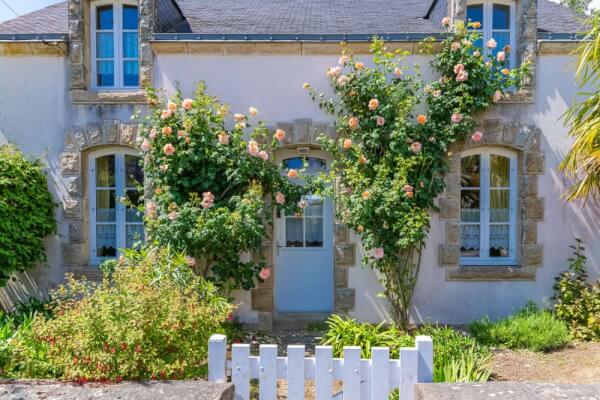Can I keep my French bank account if I move abroad?
Can I keep my French bank account if I move abroad? Find out everything you need to know here in our handy guide.

Thinking of moving across the Channel to France? France has lots to offer newcomers, including some of the best cuisine in the world and sights like the breathtaking French Riviera. In this guide, we’ll run through all the essentials you need to know about moving to France from the UK, including how to get a visa, the cost of living, options for retiring and lots more information for expats.
We’ll also show you a cost-effective way to manage your money across borders with Wise. Open a Wise account and you can send money between the UK and France for low fees* and at the mid-market exchange rate.
Learn more about the Wise account

Want to take your savings with you? Wise can also help you with large transfers. Simply email our expert team or request a call back below.
Yes, you can move to France from the UK, but it’s more complicated than it was when the UK was an EU member.
France is in the Schengen Area, so you won’t need an entry visa, but you’ll need a permit for longer stays and permanent residence. British citizens can travel without a visa for up to 90 days.1

Post-Brexit, the rules for UK citizens travelling, living, and working in the EU have changed. While moving to France from the UK is still possible, it now involves more paperwork. One of the key changes is that British citizens now require a visa to stay in France for more than 3 months.1
Additionally, you'll need to learn French to speak with the locals. It may be challenging, but many British expats have managed to do so and have made their home there.
One of the most important things to do before you can move to France is get your visa.
Known as the VLS-TS ‘Long-stay visa valid as a residence permit’, this gives you the right to remain in France for up to a year. Once you arrive, you’ll have three months to register your visa and pay a tax in addition to the visa fee.2
The VLS-TS is only suitable for workers, students, spouses of French citizens and as a Talents Residence Card. If this isn’t you, you’ll need to apply for a Type D long-stay visa and get your resident permit separately.2
The exact documents you’ll need for applying depend on the reason for your stay, so consult the France-Visas portal and find out. When the initial 12-month term of the visa is up, you can then apply to renew it.2
The best way to move to France depends on your plans after you arrive, and there are various visa options available. If you plan to work, the ideal route is to secure a job with an employer who can sponsor your visa.
Alternatively, another possible option is the self-employed person visa or the entrepreneur/profession libérale visa. If you apply within fifteen days of arriving in France, you can get the visa for a year.3

The easiest way to get to France from the UK is by plane. The cheapest month to do so is March, and it’ll cost you as little as £14.4
You might not always be able to find such a good deal, but affordable tickets are generally available. A one-way ticket to Paris costs £30-£50.5
Wise could help you save money on travel costs, especially if you’re paying in a foreign currency. With the mid-market exchange rate and no foreign transaction fees*, you’ll be able to make the most out of your money. With a Wise card you can buy flight tickets to France, and start spending in euros as soon as you arrive, without having to worry about converting currency or getting caught out by unexpected fees.
With the UK no longer part of the EU, moving your belongings now involves a slightly different process. Hiring a moving company is the best option, as they’ll have up-to-date information on import regulations.
Air freight and road freight are the most popular options, but air freight is better for urgent sending.6 Here are some companies you could consult:
Having a Wise account could be very useful when paying for a moving company. It allows you to send, receive and spend in both British pounds and euros. With transparent, low fees* and transactions at the mid-market exchange rate, so no having to stress about unexpected fees for currency conversion or added mark-up from banks or other providers.
Here are some basic facts you should know about France if you’re considering moving there:
| 💰 Currency: | Euro (EUR) |
|---|---|
| 🗣️ Main language: | French |
| 👥 Population: | 66,619,6467 |
| 🇬🇧 Number of British expats: | Around 148,0008 |
| 🧭 Popular expat destinations |
|

The cost of living in France is similar to the UK, but some individual aspects can be quite different. For example, rent is over 30% lower in France, while groceries cost around 18% more.9
Let’s take a look at a few average prices for common spending categories in France, compared with the UK:9
You can open a bank account in France as a non-citizen, although there are also non-resident accounts available for people who haven’t yet entered the country. Some banks that offer accounts suitable for expats include BNP Paribas, Crédit Agricole and Banque Populaire.10
The process to open an account usually involves visiting a branch of your chosen bank to complete an application form and provide the required supporting documents. These can vary from bank to bank, but you’ll generally need:
An important thing to bear in mind is that many French banks won’t have English-speaking staff, so you might want to take a French-speaking friend along to translate or learn the language before you move. You may also need to have some of your documents translated into French.10
It’s a good idea to contact the bank in advance to ask which documents you’ll need. And whether you’ll be able to keep your UK bank account after moving depends on your bank. For example, Barclays closes your account once you move abroad.11
📚 Opening an account in France
And, as an alternative to a bank account, check out the Wise account. You can use it to send, receive and spend in multiple currencies, including British pounds and euros. Opening the account is pretty straightforward and you can open it before you even leave the UK.
If you have the right to work in France and don’t already have a position lined up you’ll need to start job-hunting right away, possibly even before you move.
It can be difficult to find work as an expat if you don’t speak French, as you’ll be restricted to English-speaking roles which are rarer. Many employers also expect CVs produced in both French and English.12
Some of the best opportunities for British expats who don’t speak much French are in the hospitality and tourism sector, especially during summer. But there’s also a high demand for English teachers in France, so newcomers can make a living in a TEFL (Teach English as a Foreign Language) role.12
If you’re looking for jobs in France, here are a few handy places to start your search:

You don’t have to be a citizen to buy property in France, the process is the same as for EU nationals and French citizens.13 So, if you want to buy a home, here’s where to start looking:
Once you find something you like, we suggest hiring a professional, especially if you’re looking to buy a house and get a mortgage in France.
Things can get complicated, as you need to sign a preliminary contract called Compromis de Vente and pay the deposit, among other things.13
Prefer to rent instead? This is a popular option among newcomers. Many expats choose to rent temporarily, while they get a feel for the area and scout out properties to buy.
When renting, you’ll be asked for a security deposit, which should be a maximum of one month’s rent. Landlords are allowed to increase rents once per year, but the amount depends on multiple factors, such as inflation and the change in the benchmark rents.14
Other options to consider include building property in France and renovating property, read our article below for a breakdown of the costs involved, the permits you’ll need to obtain and more.
📚 Renovating property in France
Given the hefty costs involved in all of the above, it makes sense to find a provider with low fees* and transparent pricing. Wise may save you money, especially on currency conversion fees on larger amounts. Our dedicated team of experts can help assist you with every step of your transfer. Simply email us or request a call back below.
France has an excellent healthcare system, which expats can access by registering with their local Caisse Primaire d’Assurance Maladie (CPAM).15
Since many services are only partially covered by social security, it’s also recommended to take out some form of top-up health insurance, called mutuelle. This can provide coverage for any services or treatments not covered by basic health insurance.15
To ensure you get the right coverage, make sure you're correctly registered based on your situation. For instance, if you're working in France under a French contract, it must be properly recorded.15

Here’s what you should know when moving to France with a family:
In France, education is compulsory for children between the ages of three and sixteen. It consists of four cycles: preschool (écoles maternelles), primary school (école élémentaire), middle school (collège) and high school (lycée).16
When it comes to universities, the highest-ranked ones are Université Paris Sciences et Lettres, Institut Polytechnique de Paris, Sorbonne University and Université Paris-Saclay. However, there are over 3,500 higher education institutions in France.17
📚 Best private schools in France
Since the French healthcare system is one of the best in the world, pregnancy care is the same. It’s covered by public health insurance almost entirely, but you can take out private insurance on top.18
You might also be eligible for childcare benefits, which includes one payment close to €1,000.18
Your pet must enter the country within five days of your arrival, with an ISO compliant microchip and proof of rabies vaccination. Certain breeds can’t be imported if they don’t have pedigree certification, like Japanese Tosas and Staffordshire terriers.19

France is a popular destination for UK retirees, but just how easy is it to get a visa and retire in France? Let’s go through your options.
The French visa for retirees is the Type D long-stay visa mentioned above, which you can apply for at the French Consulate in London. You’ll also need to apply for a residency permit.
And once you’ve renewed your visa for 5 years in a row, you can apply for permanent residency in France. Provided you meet all the conditions and your application is successful, you’ll then be granted many of the same rights as a French citizen.20
If you manage to retire in France, you can also claim your UK state pension there. It can be paid into a UK bank account or a French one, in which case you’ll be paid in the local currency. You can choose how often you’ll get paid - anywhere from 4 to 13 weeks. Contact the International Pension Centre to get the most recent information.21
📚 How to transfer UK pension to France
Let’s go through the most important steps of moving to France from the UK:
Before moving abroad, you'll have various expenses to manage, including real estate fees, visa applications, and rental deposits, some of which may require international payments.
Open a Wise account and you can send money between the UK and France for low, transparent fees* and the mid-market exchange rate. It’s not a bank account but offers many similar features.
You can also use Wise once you arrive in your new home. You can spend in euros from the moment you step off the plane using your Wise card. It works in 150+ countries and automatically converts your pounds to the local currency, only adding a tiny, upfront currency conversion fee*.
Remember, if you’re moving to France, Wise can help with sending or receiving large amounts, our dedicated team of experts are ready to help with every step of your transfer. Simply email us or request a call back below.
Sources used:
1. Gov.uk - entry requirements
2. Service-public.fr - long-stay visa
3. France-visas.gouv.fr - self-employed person visa
4. Skyscanner - UK to France flights
5. Skyscanner - London to Paris flights
6. Pickfords - shipping to France
7. Worldometers - France population
8. INSEE - number of British expats
9. Numbeo - cost of living in France compared to the UK
10. Expatica - opening a bank account
11. Barclays - living outside the UK
12. Prospects.ac.uk - work in France
13. Properstar UK - buying property
14. Expatica - renting
15. Gov.uk - healthcare in France
16. Expatica - education in France
17. Prospects.ac.uk - studying in France
18. Expatica - having a baby in France
19. Pet Travel - pet import requirements
20. Service-public.fr - permanent residence
21. Gov.uk - State Pension if you retire abroad
Sources last checked on date: 11-Mar-2025
*Please see terms of use and product availability for your region or visit Wise fees and pricing for the most up to date pricing and fee information.
This publication is provided for general information purposes and does not constitute legal, tax or other professional advice from Wise Payments Limited or its subsidiaries and its affiliates, and it is not intended as a substitute for obtaining advice from a financial advisor or any other professional.
We make no representations, warranties or guarantees, whether expressed or implied, that the content in the publication is accurate, complete or up to date.

Can I keep my French bank account if I move abroad? Find out everything you need to know here in our handy guide.

Read our helpful guide on how to transfer a UK pension to France, including the steps, fees and taxes involved.

A guide to the French residence permit, covering who can apply, how to apply, how it works and costs.

Have a look at our complete guide to selling your property in France, including the process, fees, taxes and more.

Everything you need to know about healthcare in France for British pensioners, including your rights to state healthcare and how to register.

Everything you need to know about retiring in France, including visas, money, healthcare, pensions and more.